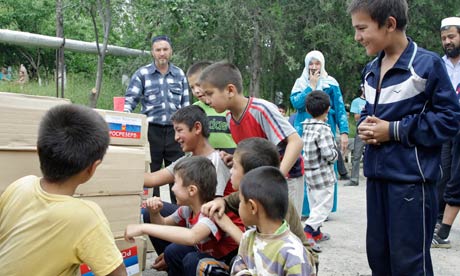
Russia spent $472.32m on foreign aid in 2010, according to the Russian ministry of finance's report released in advance of this week's G8 summit in Deauville, France.
The country's aid spending, according to the report, dropped from $785m in 2009 to $472.32m in 2010 – a decrease of 40%. However, Russia had only temporarily increased its aid budget in 2009 to soften the blow of the global financial and economic crises, particularly in the neighbouring former Soviet republics, the report says.
Though Russia has the smallest aid budget of the G8 bloc, it is often called a "re-emerging" donor. The Soviet Union provided massive amounts of aid for several decades during the Cold War – some $26bn in 1986 alone – but Russia became a net recipient of assistance in the 1990s after the fall of communism. Until last year, Russia was a recipient of UK aid.
A Russian government strategy paper, from 2007, about foreign aid policy set an annual spending target of $400-500m and talked about setting up a specialised government aid agency. "Present-day realities of global policy and economy and Russia's status of a superpower suggest that Russia could pursue a more active policy in international development assistance, including an increase in government spending for these purposes," it said. Emerging market rival Brazil already has its own aid agency and South Africa launches its development partnership agency this year.
Priorities for Russian overseas aid last year included food security and health programmes, with $98.2m for agricultural training and technology in African countries, and more than $80m on global health programmes in developing nations.
Unlike aid from many of the other large economies, most Russian development assistance is channeled through multilateral organisations, including the World Bank, the UN, and global initiatives to stimulate industry investment for vaccine research and development. More than 60% of Russian aid for global food security initiatives last year was channelled through multilateral organisations.
Russia has been up-front about the role it hopes its aid budget will play in maintaining its regional influence and rebuilding its public image. However, Andrei Bokarev, the head of international financial relations at the Finance Ministry, said in January that the government needs to do more to publicise Russia's aid programme because it doesn't get enough media coverage.
But as other G8 countries, including the US and Britain, struggle to make the case for development aid to a domestic public increasingly affected by budget cuts, Russia is experiencing its own special challenges, with one in eight Russians living below the official poverty line and millions unemployed.
"Russia is becoming a major provider of development assistance for low-income countries in the region," says the World Bank. "Yet development also remains a domestic imperative." In 2008, official poverty rates ranged from 38% in Kalmykia (in the south) to 7.4% in oil-rich Khanty-Mansiysk.
Despite the domestic problems, Russia has said the role of its foreign aid is to "strengthen the credibility of Russia and promote an unbiased attitude to the Russian Federation in the international community". A more consistent policy on international development would help strengthen its international position, said its 2007 strategy paper, and could spur Russia's domestic development by promoting trade and economic cooperation with countries that receive Russian aid. And, it added, a strong development policy could promote a "belt of good neighbourliness" along Russian borders and help address issues from drug trafficking to cross-border crime.
In response to the global financial and economic crises, Russia backed the creation of a multi-billion dollar crisis response fund to help struggling neighbours. Through the fund, Russia gave Tajikistan a $63m grant last year. And between 2006 and 2009, Russia put together a multi-million dollar package to develop health systems in neighbouring republics, in response to the threat of an influenza pandemic. More than 40 laboratory facilities in the region were re-fitted and upgraded, and 200 specialists were trained on influenza surveillance and response.
Last week, leading development charities accused the G8 of "cooking the books" in its annual accountability report, released in advance of the Deauville summit. The charities said the report covered up broken promises to the world's poor by ignoring the impact of inflation. But unlike other members of the G8 – the US, Britain, France, Germany, Japan, Italy and Canada – Russia did not make specific commitments for aid to Africa at the 2005 Gleneagles summit and does not submit its aid figures to the OECD, which monitors progress on aid pledges.
In 2007, Russia committed to the UN aid spending target of 0.7% of gross national income (GNI), though set no specific timeframe for meeting the target. If it had met the 0.7% target in 2009, Russia would have been the world's 6th largest aid donor, with a budget of $9.27bn.
Fonte: The Guardian